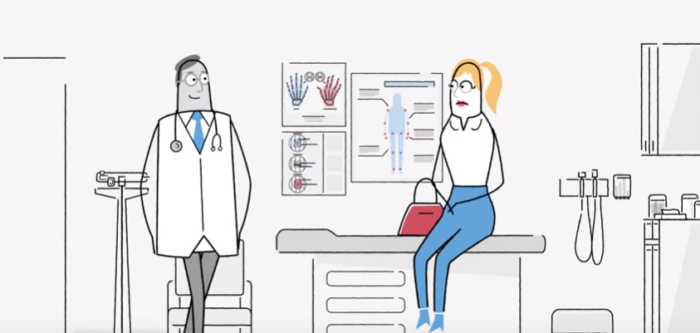Rheumatoid Arthritis Patients Want Tools for Shared Medical Decision-Making
June 11, 2019
When it comes to shared medical decision-making, European patients with rheumatoid arthritis are open to ideas.

A recent patient questionnaire from the European Alliance for Patient Access revealed that patients don’t always find it easy to talk with their doctor or nurse about their symptoms, treatment and quality of life with rheumatoid arthritis. And they welcome tips and resources to guide them on having difficult conversations.
Questionnaire responses, which reflected feedback from 128 patients across the UK, Portugal and Germany, showed that patients value shared decision-making. Patients acknowledged that it’s important:
- 100% For doctors or nurses to know the full extent of patients’ symptoms and comorbidities
- 98% For patients and doctors or nurses to jointly decide the best course of treatment
- 95% For patients to be comfortable talking with their doctor or nurse about sensitive topics.
But a gap exists between patients’ beliefs and their practices. Thinking back on their initial diagnosis, patients reported that they:
- 42% Didn’t feel comfortable asking questions about their rheumatoid arthritis diagnosis
- 41% Didn’t fully understand benefits and risks of each treatment option
- 30% Didn’t have confidence to participate in decisions about their treatment.
Those sensitivities may persist as patients continue working with their health care providers to manage their rheumatoid arthritis. Patients agreed that they currently:
- 54% Find it difficult to talk to their doctor or nurse about how rheumatoid arthritis affects their psychological well-being
- 46% Don’t always tell their doctor or nurse about how their rheumatoid arthritis affects their home or work life
- 41% Feel embarrassed to talk with their doctor or nurse about how rheumatoid arthritis affects their ability to be intimate with their partner
To help bridge the gap between the shared decision-making patients value and the day-to-day challenges of having frank conversations with their health care providers, patients overwhelmingly see the need for:
- 98% Techniques and strategies for talking and making decisions with the doctor or nurse.
In response to this need, a new “Patient Essentials” video offers tips for communicating with one’s health care provider about rheumatoid arthritis. Spanning the range of newly diagnosed patients to patients who are not achieving optimal relief with their current treatment, the video offers practical tips for open communication and shared decision-making. The video guides patients on:
- How to pose specific questions that elicit the answers they need from a health care provider
- How to broach sensitive topics like emotional well-being
- How to understand treatment options and openly discuss when the current treatment isn’t working
- How to summarise and track conversations with a health care provider to maintain an ongoing dialogue.
In obtaining questionnaire responses, EAfPA partnered with the UK’s National Rheumatoid Arthritis Society, the Portuguese League Against Rheumatism and a network of German patients who responded individually. To learn more, see EAfPA’s questionnaire findings summary and watch the new Patient Essentials video, “How to Talk with Your Health Care Provider about Rheumatoid Arthritis.”
Categorized in: Blog


